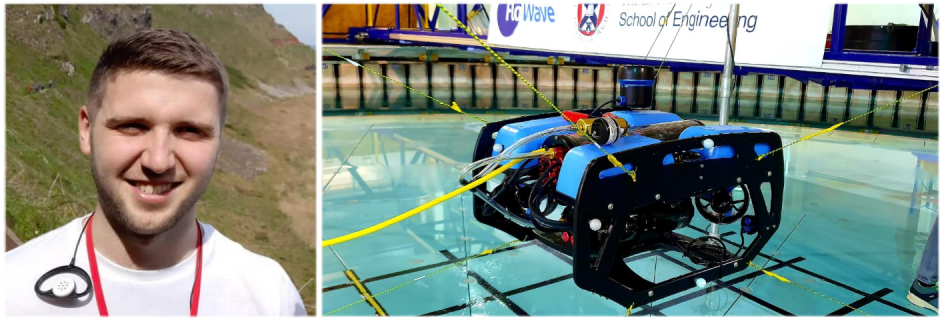Post date:
The Japanese Society for the Promotion of Science (JSPS) runs a competitive Summer Program Fellowship Award scheme each year, offering 23 placements to UK applicants to carry out research at a partner institution in Japan for around two months.
Kyle, who is in the first year of his PhD studies, will travel to Tohoku University in the Sendai region of Japan to work in Professor Satoshi Tadokoro’s Disaster Robotics Laboratory for a period of around two months between July 2020 and March 2021.
Underwater vehicles
Kyle is currently working on improving the accuracy and safety of underwater vehicles for performing inspection and maintenance on structures such as offshore renewables. He is particularly interested in how underwater vehicles perform in shallow and harsh environments and aims to push the limits of current technologies in this area.
Kyle's research seeks to develop advanced robots capable of safely and accurately performing underwater operations in the place of humans, thereby removing some of the danger associated with working in harsh marine environments and reducing operational costs.
Kyle’s supervisor, Dr Francesco Giorgio-Serchi, who is Chancellor’s Fellow at the School of Engineering, commented: “Kyle is currently involved in a very ambitious project with remarkable economic and societal potential. At present, using underwater vehicles for operation on submerged structures subject to adverse weather is an extremely daunting task and few research groups have attempted it. This makes operation and maintenance of offshore systems extremely costly and unsafe.”
Exploring soft robotics
Kyle currently uses advanced control methods in his research, but his travels to Japan will enable him to combine these with further innovative methods, including developing ‘soft’ robotic manipulators as another solution to the problem.
Kyle explained: “I will focus on developing soft manipulators which can bend and form shapes currently unattainable by rigid link manipulators. The idea is to have a manipulator which can bend into a complex shape and then stiffen on demand, so that the underwater vehicle can use this to grasp onto structures to maintain a position.”
New opportunities
The fellowship will provide Kyle with opportunities which would otherwise not have been possible. Reacting to the reward, he said: “Not only will I be conducting my research in a country which has produced some of the most advanced robotics to date, but I have the chance to spend two months in an entirely different culture and research environment which really excites me. “I’m hoping that it will lead to a lasting international collaboration with both the disaster robotics laboratory and the wider University to conduct some really interesting research.”
Dr Francesco Giorgio-Serchi added, “Despite being in the early stages of his PhD, Kyle has already shown great determination in establishing international collaborations. This prestigious fellowship will allow Kyle to spend two months at the Disaster Robotics Lab of Tohoku University in Sendai, which is a great opportunity both for Kyle and for our School to further tighten the links with world-renowned robotics laboratories.”



